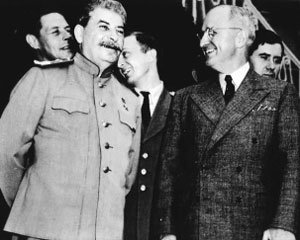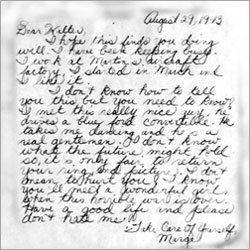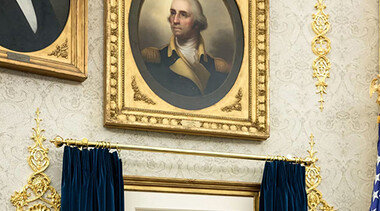- 아내에게서 ‘Dear John’으로 시작되는 편지를 받으면 조심해야 한다. ‘친애하는 존’이 아니라 ‘이혼 요구서’라는 뜻이기 때문. 영어로 장삼이사(張三李四)는 ‘Joe six-pack’ ‘Peter·Paul & Jack·Gill’이며, 깡마른 사람은 ‘Slim Jim’이다. 인명이 여러 가지 다른 뜻으로 쓰이는 이야기들이 흥미롭다.

전형적 미국인을 상징하는 엉클 샘’ 캐리커처.
이름 각 부분에 대한 명칭
(1) name given at birth(태어나면서 얻은 이름) : first name = forename = pre-name = given name
(2) inherited name (조상으로부터 물려받은 이름) : last name = surname(성) = family name(가문 명)
(3) names other than one´s surname (성 이외의 모든 이름) : forenames = pre-names = personal name
(4) maiden name = the surname that a married woman had at birth : (결혼한 여성이 태어날 때 받은 성)
surname의 유래
The word surname derives from Latin super(‘over’ or ‘above’), meaning ‘additional name’. As early as the 14th century it was also spelled as sirname or sirename(suggesting that it meant ‘man´s name’ or ‘father´s name’).
(surname이라는 단어는 라틴어 super(‘over’ or ‘above’)에서 나온 말로 ‘부가적인 이름’이란 의미다. 이 단어가 일찍이 14세기에는 sirname 또는 sirename이라고 철자되기도 했는데 이것은 이 단어가 ‘남자의 성’ 또는 ‘아버지의 성’을 뜻한다는 것을 시사한다.)
일본 천황(天皇 heavenly sovereign)은 현인신(現人神·현실세계에 존재하는 살아 있는 인간신)으로 숭배받는다. 이러한 ‘현인신 숭배(Emperor God-Worship)’사상에 근거해 일본 왕가(王家)는 성(姓)이 없다. 현재 천황의 full name은 Akihito(裕仁·1933~)이고, 직전 천황의 full name은 Hirohito(昭和·1901~ 1989)이다. 그 이유는 다르지만 아프가니스탄 사람들도 대부분 별도의 성이 없다.
middle name
미국의 제35대 대통령인 John Fitzgerald Kennedy의 이름을 보자. 그의 아버지 Joseph Patrick ‘Joe’ Kennedy, Sr.(1888~1969)는 Rose Elizabeth Fitzgerald와 결혼했다. 그녀는 보스턴시장과 연방하원의원을 지낸 John Francis ‘Honey Fitz’ Fitzgerald (1863~1950)의 딸이다. 여자가 결혼하면 남편의 성을 따르는 것이 영어권 관습이다. 그래서 그녀는 Rose Fitzgerald Kennedy가 되었다. 이 부부의 둘째아들이 John Fitzgerald Kennedy다. 결국 그의 first name은 외할아버지(maternal grandfather)의 first name이고, middle name은 외할아버지의 last name(=어머니의 middle name)이고, last name은 아버지의 last name이다.
Truman´s middle initial
Jon F. kennedy의 F.는 Fitzgerald를 대신(stand for)하지만, Harry S Truman 대통령의 ‘S’는 이니셜(initial·머리글자)이 아니고 그냥 ‘S’다.
Truman did not have a middle name, only a middle initial. In his autobiography, Truman stated, “My Grandfather Truman´s name was Anderson Shippe Truman and my Grandfather Young´s name was Solomon Young, so I received the S for both of them.” His parents chose ‘S’ as his middle name, in attempt to please both of Harry´s grandfathers, but it didn´t stand for anything, as was a common practice among Scotch-Irish.”
(트루먼은 중간 이름이 없고 중간 이니셜만 있다. 그는 자서전에서 이렇게 말했다. “친할아버지 이름은 Anderson Shippe Truman이었고 외할아버지의 이름은 Solomon Young이었다. 그래서 나는 양쪽으로부터 이 S를 부여받았다.” 부모가 양쪽 할아버지를 모두 즐겁게 하기 위하여 중간 이름으로 S를 선택했지만 그것이 어떤 것도 대신하지는 않았다. 이것은 Scotch-Irish(미국에 이주한 스코틀랜드계열 아일랜드 사람)의 일반적인 관습이었다.)
middle name의 다른 의미

트루먼 전 미국 대통령(오른쪽)은 ‘이니셜’이 아닌 ‘S’자를 가운데 이름으로 썼다.
[작문]나는 정직한 사람이야.
Honesty is my middle name.
이름이 한 부분인 경우와 두 부분 이상인 경우
Douglas MacArthur(1880~1964)처럼 이름이 두 부분으로만 된 경우도 있다. 미군에서는 병사의 이름을 세 부분으로 기록하는데, 중간 이름이 없으면 NMN(=No Middle Name)이라고 표기한다.
names other than one´s surname (성 이외의 모든 이름), 즉 forenames(=pre-names · personal name)이 셋 이상인 경우도 있다. 미국의 제41대 대통령 George Herbert Walker Bush는 아버지이고, 제43대(현) 대통령 George Walker Bush는 아들이다.
피카소(Pablo Ruiz Picasso·1881~ 1973)의 full name(성+명=성명)은 Pablo Diego Jose Francisco de Paula Juan Nepomuceno Maria de los Remedios Cipriano de la Santisima Trinidad Clito Ruizy Picasso다. 21개 단어, 111자에 달한다. 부모 성에 친할아버지, 외할아버지, 대부, 대모 등 직계의 부계 모계에다가 방계의 성명까지 합쳐놓았다. ‘피카소’는 어머니 성이다.
미국 영국 독일 일본 중국 등에선 부모가 두 사람 성 가운데 하나(주로 아버지 성)를 자녀의 성으로 골라준다. 덴마크 노르웨이 핀란드 스웨덴도 마찬가지지만 따로 선택하지 않으면 어머니 성을 따른다.
▼ 닉네임 이야기
The term ‘nickname’ originated as an Anglo-Saxon word: ekename. In the Anglo-Saxon tongue, ‘eke’ meant ‘also’ or ‘added.’ The term seemed just a bit akward to pronounce; so, it became slurred, converting ekename to nekename and finally to become nickname.
(‘닉네임(nickname 애칭·별명)’이라는 용어의 기원은 앵글로-색슨 말인 ekename이다. 앵글로-색슨 말에서는 eke가 also(또한)나 added(덧붙인)를 의미했다. 이 단어는 발음하기가 약간 어색했다. 그래서 분명치 않게 굴려 발음하다보니 ekename이 nekename으로, 마침내는 nickname이 되었다.)
A nickname is a name of a person or thing other than its proper name. It may either substitute or be added to the proper name. It may be a familiar or truncated form of the proper name, such as Bob, Bobby, Rob, Robbie, Robin, and Bert for Robert. A nickname is sometimes considered desirable, symbolizing a form of acceptance, but can often be a form of ridicule.
(닉네임은 사람이나 사물이 갖는 고유명(proper name)이외의 이름이다. 그것은 고유명을 대신하거나 고유명에 덧붙일 수 있다. 그것은 고유명과 유사하거나 끝을 자른 형태다. 예를 들면 Robert를 대신한 Bob, Bobby, Rob, Robbie, Robin, Bert 같은 것이다. 닉네임은 때로는 바람직한 것으로 간주되어 일종의 호의를 나타내기도 하지만 때로는 일종의 조소로 간주될 수도 있다.)
성명 속에 들어 있는 애칭
따옴표 안에 들어가 있는 부분이 애칭이다. 미국의 39대 대통령 카터(James Earl ‘Jimmy’ Carter)의 애칭은 지미(Jimmy)이고, 미국의 55대 하원의장 오닐(Thomas ‘Tip’O´Neill·1912~1994)의 애칭은 팁(Tip)이다.
Jonathan Mayhew ‘Skinny’ Wain-wright IV(1883~1953) was a United States Army general and the commanding officer of Allied forces in the Philippines at the time of their surrender to the Empire of Japan during World War II. General Wainwright is a recipient of the Medal of Honor and on September 14, 1945 a Ticker Tape parade was held in his honor.
(조너선 메이휴 ‘스키니(말라깽이)’ 웨인라이트(1883~1953)는 미국육군 장성이었고 제2차 세계대전 중 일본에 항복할 당시 필리핀 연합군 사령관이었다. 웨인라이트 장군은 명예훈장을 받았으며, 그에게 경의를 표하기 위해 1945년 9월14일 티커테이프 퍼레이드가 거행되었다.) ※ ticker tape parade: (미국 New York시 전통의) 색종이 테이프가 뿌려지는 행진.
▼ 다른 뜻으로 쓰이는 이름들

군대 간 남편에게 이혼을 요구하는 편지(Dear John)의 하나.
Slim Jim 깡마른 사람
the Jones 이웃사람
Dear John 이혼 요구서
Joe[joe] six-pack 미국의 서민
Peter·Paul & Jack·Gill 장(張)씨·이(李)씨 & 갑남을녀
Brother Jonathan 브라더 조너선(전형적인 미국사람)
Uncle Sam 엉클 샘(전형적인 미국사람)
Yankee 양키
John Bull 전형적인 영국사람
Slim Jim
뜻: ① 깡마른 사람 ② key를 차 안에 두고 밖에서 문이 잠겨버려 열지 못하는 경우에 사용하는 가는 금속 조각
I left my keys in my ´06 G6 Pontiac, and I am locked out. I had access to some tools, but couldn´t get back in. I don´t have a Slim Jim. I was not successful in using a coat hanger.
(2006년형 G6 Pontiac 안에 키를 놔두고 문이 잠겼다. 몇 가지 도구를 써보지만 들어갈 수가 없었다. Slim Jim이 없다. 옷걸이도 써봤지만 허사였다.)
Jones
비서가 보스에게 A Mr. Jones has arrived to see you(‘존스’라는 분이 사장님을 뵈려고 오셨습니다)에서는 Jones가 특정인물을 지칭하지만 일반적으로 평범한 보통사람을 이를 때 쓴다. 흔한 이름이 Jones[d,ounz]이기 때문이다. 복수형은 Joneses[d,?nziz]다. the Jones는 ‘평범한 가정’을 말하고, the Joneses는 ‘이웃 사람들’을 말한다. ‘keep up with the Joneses’는 미국 구어에서 ‘이웃 사람들에게 지지 않으려고 허세를 부리다’ ‘이웃 사람들에게 지지 않으려고 분수 이상의 생활을 하다’는 의미의 성구(成句)로 사용된다.
[작문] 다른 사람이 날 앞서가는 건 싫다. 남에게 뒤처지지 않으려고 한다.
I don´t want other people to get ahead of me. I try to keep up with the Joneses.
I don´t want other people to get ahead of me. I try not to fall behind the Joneses.
[대화] A: It´s really difficult to keep up with the Joneses.
B: You don´t have to do the same thing that everyone else does.
A: 남보다 뒤처지지 않으려고 하는 건 정말 힘들어.
B: 남이 한다고 해서 너도 꼭 할 필요는 없어.
Dear John
뜻: ①(병사에게 보낸 아내의) 이혼 요구서 ②(애인이나 약혼자가 보낸) 절연장[절교장]
[대화] A: Robert got a dear John (letter) from Vivian.
B: How come? Has their relationship no future?
A: 로버트가 비비언한테서 절교를 당했대.
B: 왜? 장래에 대한 확신이 없나?

존 피츠제럴드 케네디(John Fitzgerald Kennedy) 전 미국 대통령의 ‘미들 네임’은 외할아버지의 성에서 따왔다.
(Dear John letter라는 말은 흔히 여자가 다른 남자가 생겨서 그들의 관계가 끝났다는 것을 알리기 위해 남편이나 남자친구에게 쓴 편지를 말한다. 이 말의 정확한 어원은 알려져 있지 않지만 제2차 세계대전 때 미국인들이 만들어낸 말이라고 믿어진다.)
As letters to servicemen from wives or girlfriends back home would typically contain affectionate language, a serviceman receiving a note beginning with a curt ‘Dear John’(as opposed to the expected ‘Dear Johnny’, ‘My dearest John’, or simply ‘Darling’, for example) would instantly be aware of the letter´s purpose.
(고국에 있는 아내나 여자 친구가 군인에게 보낸 편지에는 애정 어린 언어가 포함되는 것이 전형적인 편지 스타일이었기 때문에, Dear John - 예를 들면 예상했던 Dear Johnny(사랑하는 조니), My dearest John(나의 가장 사랑하는 존), 혹은 간단하게 Darling(여보)과는 반대되는 - 이라고 간략하게 시작하는 짧은 편지를 받은 군인은 곧바로 그 편지의 목적을 알아차렸다.) ※ Johnny: John의 애칭
There are a number of theories on why the name John is used rather than any other. John was a common name in America at the time the term was coined. John is also the name used in many other terms that refer to an anonymous man or men, such as ‘John Doe’ or ‘John Q. Public’.
(왜 다른 이름이 아닌 존이라는 이름이 사용되었는지에 대해서는 많은 주장이 있다. 이 용어가 생겨난 당시에는 John이라는 이름이 많았다. 또한 John은 ‘아무개(John Doe)’나 ‘일반 대중(John Q Public)’과 같이 익명의 사람이나 사람들을 이르는 많은 다른 용어에 사용된 이름이다.) ※ John Doe: 이름 없는 사람, 모씨(某氏), 아무개, John Q Public: (구어) 평균적 일반 시민, 일반 대중
Further, there existed prior to World War Two a radio program starring Irene Rich which was presented as a letter written by a gossipy female character to her never-identified romantic interest. It was both titled and opened with the words ‘Dear John’, and may have contributed to the genesis of the term.
(게다가 제2차 세계대전 이전에 여성 수다쟁이 캐릭터가 연애감정을 불러일으키는 미지(未知)의 사람에게 쓴 편지로 소개된 이렌 리치(Irene Rich) 주역의 라디오 프로그램이 있었다. Dear John이라는 두 개의 단어로 타이틀이 붙여져 시작되었는데, 이것이 이 용어의 생성에 기여했을 것으로 추정된다.) ※이렌 리치(Irene Rich·1891~1988, 미국여배우): an elegant, melodramatic heroine of the silent screen who made occasional forays into sound pictures(때때로 유성영화에도 출연한 우아하고 몹시 감상적인 무성영화 여주인공)
Joe[joe] six-pack
He´s a good Joe[joe]. (그는 좋은 놈이다.)
I´m just a Joe[joe] Six-pack. (저는 보통 사람일 뿐입니다.)
I want my six-pack stomach back. (예전의 왕(王)자가 새겨진 배를 다시 찾고 싶다.)
Joe(남자이름)는 Joseph의 애칭이지만, 이름을 모르는 사람을 부를 때 우리식으로 치면 ‘여보게’ ‘자네’ ‘형씨’의 뜻으로 사용한다. 이뿐만 아니라 사내(fellow), 녀석(guy)이란 의미를 갖기도 하며, 이 경우 joe(소문자)로 쓰기도 한다. six-pack은 캔[병] 맥주 등 6개들이 종이상자나 그 내용물을 말한다. 서민이 주로 six-pack을 사 가지고 귀가하는 것을 빗대, ‘보통의 미국인’을 Joe[joe] Six-pack이라 한다. 근로계층과 서민층은 맥주를, 부유층은 와인을 즐기는 것이 일반적이다.
six-pack에는 또 하나의 익살스러운 의미가 있다. ‘(배의 근육이 잘 단련되어 여섯 개의 조각으로 나눠져) 王(왕)자 모양으로 보이는’이라는 의미다. six-pack stomach는 ‘王자가 새겨진 복부’다. washboard stomach(빨래판 복부)가 같은 의미로 사용된다. I do sit-ups every night to keep my stomach muscles toned(날씬한 배를 갖기 위하여 매일 밤 복근운동(윗몸 일으키기)을 한다)가 있다.
Peter·Paul & Jack·Gill
[영작]나는 이쪽 빚으로 저쪽 빚을 갚고 있다.
I´m robbing Peter to pay Paul.
[영작]팔방미인이 정통한 일은 하나도 없다.
Jack of all trades is master of none.
Jack of all trades, and master of none.
[영작]공부만 시키고 놀게 하지 않으면 아이는 바보가 된다.
All work and no play makes Jack a dull boy.
[영작]총각마다 제 짝이 있다. 짚신도 제 짝이 있다.
Every Jack has his Gill.
Brother Jonathan (브라더 조너선: 전형적인 미국사람)
Brother Jonathan was a fictional character created to personify the entire United States, in the early days of the country´s existence. In editorial cartoons and patriotic posters, Brother Jonathan was usually depicted as a typical American revolutionary. Originally, from 1776 to 1783, ‘Brother Jonathan’ was a mildly derisive term used by the Loyalists to describe the Patriots.
(Brother Jonathan은 미국 건국 초기에 만들어진 허구상의 인물로 미국인 전체를 상징하였다. 흔히 시시만화와 애국심을 불러일으키는 포스터에서 Brother Jonathan은 미국의 전형적인 혁명가로 묘사되었다. 원래 Brother Jonathan은 1776년과 1783년 사이 Loyalist(독립전쟁 때의 독립 반대자)가 Patriot(독립파인 애국지사)를 점잖게 조롱하는 용어였다.)
However, Brother Jonathan, and variants of the name Jonathan continued to be used as slang references to Americans through the American Civil War. For example Johnny Reb meant a Confederate soldier, and a popular song was “When Johnny Comes Marching Home”.
(그러나 Brother Jonathan과 그 변형은 미국 남북전쟁 내내 미국인을 가리키는 통용어로 사용되었다. 예를 들어 Johnny Reb은 남군(Confederate soldier)을 의미했으며, ‘When Johnny Comes Marching Home(조니가 행진하며 집으로 올 때)’는 인기 있는 노래였다.)
Uncle Sam (엉클 샘: 전형적인 미국사람)
Uncle Sam is a national personification of the United States, with the first usage of the term dating from the War of 1812 and the first illustration dating from 1852. He is often depicted as a serious elderly man with white hair and a goatee, with an obvious resemblance to President Andrew Jackson, and dressed in clothing that recalls the design elements of the flag of the United States ─ for example, typically a top hat with red and white stripes and white stars on a blue band, and red and white striped trousers.
(엉클 샘(샘 아저씨)은 미국을 의인화한 것이다. 이 용어는 1812년 미영전쟁 때 처음 사용되었고 1852년에 처음으로 일러스트레이션(삽화)이 그려졌다. 보통 흰 머리에 염소수염을 기르고 진지한 표정에 나이가 지긋한, 앤드루 잭슨 대통령 (Andrew Jackson·미국 제7대 대통령 1767~1845)을 꼭 닮은, 미국 국기의 기본 디자인을 연상시키는 복장- 붉은색·흰색 줄무늬가 있고 푸른색 띠 바탕에 흰색 별들이 그려진 실크 모자, 그리고 붉은색·흰색 줄무늬 바지 -을 한 남자로 그려진다.)
Common folklore holds origins trace back to soldiers stationed in upstate New York, who would receive barrels of meat stamped with the initials US. The soldiers jokingly referred to it as the initials of the troops´ meat supplier, Samuel Wilson. The connection between the popular cartoon figure and Samuel Wilson was reported in the New York Gazette on May 12, 1830.
(널리 알려진 민간전승에 따르면 어원은 뉴욕 주의 벽촌에 주둔한 군인들로 거슬러 올라간다. 그들은 US라는 이니셜(머리글자) 도장이 찍힌 몸통고기를 받아가곤 했다. 군인들은 농담으로 그것(US)을 부대의 고기공급업자인 Samuel Wilson의 이니셜이라고 불렀다. 이 널리 알려진 시사만화 인물과 Samuel Wilson과의 관계가 1830년 5월12일 뉴욕 가제트지에 보도되었다.) ※ Sam은 Samuel의 애칭으로 US는 Uncle Sam의 이니셜이며 동시에 United States의 이니셜이기도 하다.
Yankee (양키)
▲ Etymology (어원)
Historically, the term usually refers to residents of New England, as used by Mark Twain in A Connecticut Yankee in King Arthur´s Court. During and after the American Civil War, its popular meaning expanded to include any Northerner and any resident of the Northeast.
(마크 트웨인이 그의 저서명 ‘아서 왕궁의 코네티컷 양키 A Connecticut Yankee in King Arthur´s Court’에서 사용한 것처럼 역사적으로 이 말은 뉴잉글랜드 지방(메인·뉴햄프셔·버몬트·매사추세츠·로드아일랜드·코네티컷 주 등)의 거주자를 말한다. 남북전쟁(1861~65) 당시 그리고 그 후 이 말의 통속적 의미가 확대되어 북부사람과 동북부지역의 거주자를 포함했다.) ※ ‘아서 왕궁의 코네티컷 양키’: 19세기말 미국의 한 기술자가 정신을 잃은 뒤 다시 깨어나 보니 영국의 아서 왕 시대로 날아갔다는 특이한 소재로 봉건제와 지배계급에 대한 풍자를 담은 소설.
The Oxford English Dictionary suggests the most plausible origin to be that it is derived from the Dutch first names ‘Jan’ and ‘Kees’. ‘Jan’ and ‘Kees’ were and still are common Dutch first (given)names or nicknames. In many instances both names(Jan-Kees) are also used as a single first name in the Netherlands. Jan may have been used as a reference to the settlers of New York(New Amsterdam at the time) who were Dutch. The word Yankee in this sense would be used as a form of contempt, applied derisively to Dutch or English settlers in the New England states.
(‘옥스퍼드 영어사전 The Oxford English Dictionary’에 따르면 이 용어의 가장 그럴듯한 어원은 네덜란드인의 이름인 Jan과 Kees에서 유래했다는 것이다. Jan과 Kees는 예나 지금이나 네덜란드인의 가장 흔한 이름이거나 별명(애칭)이다. 또한 네덜란드에서는 이 두 개의 이름을 합친 Jan-Kees가 하나의 이름으로 사용된 것을 많은 예에서 볼 수 있다. Jan은 네덜란드인으로 이루어진 뉴욕(당시의 뉴 암스테르담)의 정착민을 이를 때 사용한 것으로 볼 수 있다. 이러한 의미를 가진 Yankee라는 말은 뉴잉글랜드 지방에 사는 네덜란드나 영국에서 온 거주자들을 조롱하는 경멸어로 사용되었을 것이다.)
One influence on the use of the term has been the song Yankee Doodle, which was popular at the time of the American Revolutionary War(1775~ 1783). Though the British intended to insult the colonials with the song, following the Battle of Concord, it was adopted by Americans as a proud retort and today is the state song of Connecticut. The ‘damned Yankee’ usage dates from 1812. During and after the American Civil War (1861~1865) Confederates popularized it as a derogatory term for their Northern enemies.
(이 용어의 사용에 영향을 미친 것 중 하나는 독립전쟁(1775~1783) 때 미국인이 애창한 노래 ‘양키 두들 Yankee Doodle’이었다. 영국군이 콩코드 전투(Battle of Concord) 이후 그들의 식민지인 미국을 조롱하기 위해서 만든 노래이지만, 미국인들은 이 곡을 자랑스럽게 불러 역공을 펼쳤으며 오늘날에는 코네티컷의 주가(州歌)가 되었다. ‘빌어먹을 양키(damned Yankee)’가 사용된 것은 1812년부터다. 남북전쟁 (1861~1865) 당시 그리고 그 후 남군(Confederates)은 북군의 자존심을 깔아뭉개기 위해 이 용어를 유행시켰다. ※ 콩코드 전투: 미국 독립전쟁의 시발점이 된 영국 정규군과 미국 주민들 간의 첫 소규모 충돌
▲ Contemporary uses within the United States (미국 내에서의 쓰임)
Traditionally Yankee was most often used to refer to a New Englander in which case it may suggest Puritanism and thrifty values, but today refers to anyone coming from a state north of the Mason-Dixon line, with a specific focus still on New England.
(전통적으로 주로 양키는 청교도적인, 엄격하고 검소한 사람을 암시하는 뉴잉글랜드 사람을 가리키는 데 쓰였다. 그러나 오늘날에는 메이슨-딕슨 라인 북쪽 주(州) 출신 사람을 가리키면서 본질적으로는 여전히 뉴잉글랜드 지방에 초점이 맞춰져 있다.) ※ Mason-Dixon Line: Maryland 주와 Pennsylvania 주를 가로지르는 라인으로, 과거 미국의 북부와 남부를 나누는 분계선이었다.
▲ Contemporary uses in other English-speaking countries (영어를 말하는 다른 나라에서의 쓰임)
In English-speaking countries outside the United States, especially in Australia, Canada, Ireland, New Zealand and the United Kingdom, Yankee, almost universally shortened to Yank, is used as a derogatory or playful colloquial term for all Americans. In the Commonwealth, ‘Yank’ has been in common use since at least World War II, when thousands of Americans were stationed in the UK, Australia and New Zealand. Depending on the country, ‘Yankee’ may be considered mildly derogatory.
(미국 밖의 영어를 말하는 나라, 특히 오스트레일리아, 캐나다, 아일랜드, 뉴질랜드, 영국에서는 양키(Yankee) - 흔히 줄여서 양크(Yank) - 는 모든 미국인을 농담 섞인 경멸적 어조로 부르는 구어체로 쓰인다. 영연방에서는 적어도 제2차 세계대전 이래 미국이 수천명의 미국사람을 영국, 오스트레일리아, 뉴질랜드에 주재시켰을 때 Yank가 일반적으로 사용되었다. 나라에 따라서는 Yankee가 조심스럽게 말하는 경멸조로 간주된다.)
▲ Contemporary uses in other parts of the world (세계의 다른 지역에서의 쓰임)
In some parts of the world, particularly in Latin American countries, and in East Asia, yankee or yanqui is used sometimes as an insult politically associated with anti-Americanism and used in expressions such as “Yankee go home” or “we struggle against the yanqui, enemy of humanity”.
(세계의 어떤 지역, 특히 라틴아메리카와 동아시아에서는 yankee나 yanqui가 정치적으로 반미감정을 담은 모욕적인 언사로 쓰이며, “양키야 너희 나라에 가라 (Yankee go home)”이나 “우리는 인류의 적인 양키와 투쟁한다(we struggle against the yanqui, enemy of humanity)”와 같은 표현으로 사용된다.)
In Argentina, Paraguay and other Latin American countries, however, the term is referred to as someone who is from the US and hardly ever derogatory. In the late 19th century the Japanese were called ‘the Yankees of the East’ in praise of their industriousness and drive to modernization. In 21st century Japan, the term Yank1- is used to refer to a type of delinquent youth who often sports brightly bleached hair. The variation, ‘Yankee Air Pirate’ was used during the Vietnam War in North Vietnamese propaganda to refer to the United States Air Force.
(그러나 아르헨티나, 파라과이, 그리고 다른 라틴 국가에서는 이 말이 미국출신에게 사용되며 경멸적 의미는 거의 없다. 19세기말 일본은 그들의 산업화와 현대화 드라이브를 찬양하여 스스로 ‘동양의 양키’라고 불렀다. 21세기 일본에서는 얀키(Yank1-·ヤンキ―)라는 용어가 머리를 노랗게 염색한 빗나간 청소년을 가리키는 데 사용된다. ‘양키 공중해적(Yankee Air Pirate)’이라는 변종이 월남전 당시 월맹의 선전활동에서 미국공군을 지칭하는 데 사용되었다.)
John Bull(전형적인 영국사람)
John Bull is a national personification of the Kingdom of Great Britain created by John Arbuthnot in 1712, and popularized first by British print makers and then overseas by illustrators and writers such as American cartoonist Thomas Nast and Irish writer George Bernard Shaw, author of John Bull´s Other Island.
(존 불(John Bull)은 1712년 존 아버스넛(John Arbuthnot)이 창작한 영국을 의인화한 인물로 처음에는 영국의 판화 제작자에 의하여 알려졌으며, 나중에는 미국의 만화가 토머스 내스트(Thomas Nast)와 ‘존 불의 다른 섬 John Bull´s Other Island’의 저자인 아일랜드 작가 조지 버나드 쇼(George Bernard Shaw)와 같은 사람에 의해 해외에 알려졌다.) ※ 존 아버스넛(John Arbuthnot ·1667~1735): 영국의 의사이며 풍자 작가. 앤 여왕의 주치의였으며, 1712년에 평론집 ‘존 불의 역사 The History of John Bull’를 간행하였다. 전형적인 영국인을 가리켜 보통 ‘존 불(John Bull)’이라고 부르는 것은 그의 저서에서 유래하였다.
|
He is sometimes used to refer to the whole of the United Kingdom, but has not been widely accepted in Scotland or Wales as he is viewed there as English rather than British. Britannia, or a lion, is therefore used as an alternative in some editorial cartoons. Although embraced by Unionists, Bull is rejected by most nationalists in Northern Ireland as well.
(존 불은 종종 영국 전체를 가리키는 데 사용되었으나 스코틀랜드와 웨일스에서는 널리 받아들여지지 않았다. 존 불이 거기에서는 영국(Britain)적 존재라기보다는 잉글랜드(England)적 존재로 간주되었기 때문이다. 그리하여 어떤 시시만화에서는 브리태니아(Britannia) - Great Britain 또는 British Empire를 상징하는 여인상(像) - 나 사자가 대안으로 사용되었다. 존 불은 유니오니스트(Unionist·아일랜드 자치안에 반대한 연합주의자)에의해 옹호됐지만 북아일랜드의 민족주의자들에 의해서 거부됐다.)


















![[신동아 만평 ‘안마봉’] 2026년 ‘반중 지도자군(群)’의 행진](https://dimg.donga.com/a/300/200/95/1/ugc/CDB/SHINDONGA/Article/69/9e/7c/5e/699e7c5e023ba0a0a0a.png)



![[신동아 만평 ‘안마봉’] 2026년 이재명 대통령의 ‘부동산 행상’](https://dimg.donga.com/a/380/211/95/1/ugc/CDB/SHINDONGA/Article/69/9d/5f/99/699d5f9911b7a0a0a0a.png)

![[영상] 김다현 “언제나 내 편인 ‘얼씨구다현’과 함께 붉은 말처럼 달리렵니다”](https://dimg.donga.com/a/380/211/95/1/ugc/CDB/SHINDONGA/Article/69/8b/df/02/698bdf022269d2738e25.jpg)